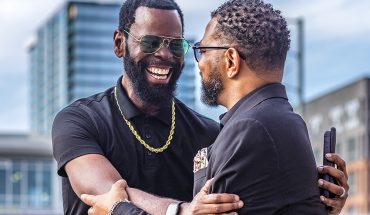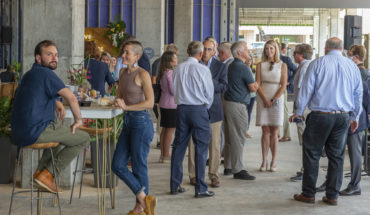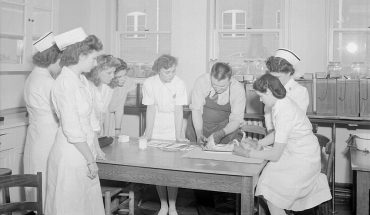On a brisk winter day, WALTER sat down with Mayor McFarlane at The Dillon to learn more about her life and work. Here’s what she told us.
By Ayn-Monique Klahre | Photography by S.P. Murray

Can you tell me why you moved down here? I understand you’re originally from Virginia.
I moved here in 1984 for my husband’s job. We were both pharmacists, living in Richmond at the time, and his company decided not to stay in Virginia. Our choices were Chicago, Pittsburgh, Baltimore, or Raleigh. So we thought, our families are in Virginia and that’s not too far. Then we just stayed.
What kept you here?
I already had one baby. I started working at Raleigh Community Hospital and had two more, and you know how it is—you build a community and make friends, and we were happy. My husband changed jobs a couple times, but we never even considered moving somewhere else. Beyond that, people are just genuinely nice here. The city has changed so much the past 30 years—when I arrived, the only thing downtown was the library—but we still have that warm spirit. For example, I know a lot of the restaurateurs here are all friends, but they don’t see each other as competition. They understand that together they lift each other up. You don’t see that very often. Beyond that, we have so many amenities—the Ballet, the Symphony and the Art Museum—and great organic growth in terms of homegrown musicians and contemporary artists.
So what’s new within the last year that you’re the most excited about?
We just opened Union Station, that was great to see. We broke ground on the Oak City Center, a partnership with the county and Catholic Charities to centralize all the resources for people who are homeless or on the verge of it. We’ve also focused on affordable housing this year, particularly workforce housing, so people like teacher’s assistants can still afford to live in the city. Another piece is transit. It takes a lot of planning—it takes 24 months to order a bus!—but one key is to expand service to every 15 minutes, because if you have to wait an hour for the bus, it’s not working for you. People think of affordability as the price of a structure, the rent or the mortgage, but if you can have no car or one less car, that helps with the cost of living.
What areas of Raleigh are seeing the biggest growth?
Downtown is very popular, but so is the North Hills-Midtown area. It’s about providing choices for people, because there will always be people that want a big backyard. Raleigh’s two biggest demographics are millennials and aging baby boomers—groups that either don’t want to drive or won’t be able to—so we want to create a place where people can walk and be connected to other cities.
How are you connecting?
It’s complicated. We were trying to create a Triangle-wide light rail system, but it got tied up in politics, so we’re working on bus rapid transit. The connector to the Durham-Orange light rail will be the commuter rail, which we already have tracks for, it’s just about figuring out all the pieces. It all takes time, and people start to get impatient, and I get a little impatient, too.
It seems to take a lot of steps!
Anytime you start a project, you’ve got to go through all these different routes, like a series of public meetings—which is good, because we’re impacting people’s lives—and environmental studies that take years and have to be approved at the state and federal level. Here the mayor has a two-year term, so it’s hard to get through long-term projects. You have to know that you’re doing the right thing for the city and push forward.
Does anything ever move quickly?
Sometimes you have things like Dix Park, where there’s unbelievable support. When we planted the sunflowers, we got 3 million social media hits. It was crazy! We’ve had 45,000 people add input in some way, there’s a real sense of community ownership on that plan.
Why did you get into politics?
When my kids started school, I realized how much county decisions were affecting their education. When my coworker, Roxy Cash, decided to run for school board—she’s on the board now, too—I worked on her campaign. I started finding out a lot about how decisions are made. Then I worked on a bond campaign and other people’s campaigns, and after a few years I knew a bunch of people who had been elected. But I didn’t want to run because… well, I had three kids at home and my husband traveled a lot. It wasn’t my priority.
But by 2007 my youngest was a senior in high school, my business had gotten big enough that I had a lot of managers, and Charles [Meeker, the previous mayor] was really pushing me to run. So I looked at District A, where I lived, and I thought, you know? I’ve been on every PTA, I was the president of the homeowner’s association, my son is off to college in six months; ok I’ll do it, I’ll run for council. And I won!
So you were convinced to do it?
The truth is, you get invested in what you’re doing, so it started to feel like, if I don’t do it, who will?

When you were elected mayor the first time, were you just shocked?
Yes! I remember being in the car on my way to watch the results at a pub and there were TV trucks lined up outside and I was like, what have I done? I’m the mayor of a city!
Do you interact with other mayors?
I go to the U.S. Conference of Mayors and participate in Metro Mayors, for mayors in larger cities. Everyone is complaining about the same things, but they’re also sharing their ideas. Shortly after I started, I was invited to a design event with architects and designers, and each mayor had to bring in a problem. Mine was the warehouse district. At the time there was nothing down there, and I said, it’s cool and we don’t have that many old buildings in Raleigh; as this city grows, I’m worried about losing the character. So we ended up coming up with a plan, which is exactly what happened here: If you want to build, you have to keep the character on the pedestrian level of the building.
What’s your day-to-day like?
It’s different each day. Some days it’s all meeting with people and planning, other days I’m at a school reading a book to kids.
How do you find the balance of going to events versus sitting at your desk?
Anything that’s related to the state, I’m going to. I do a lot of dedicating buildings, those real estate deals bring in thousands of jobs. Sometimes a friend calls for a small thing. But I can’t do everything.
What do you do in your time off?
Hang out with my granddaughter, that’s my go-to. And you know, there’s a great deal of pleasure in just sitting on the couch in my pajamas!
Do you have a favorite coffee shop… or are you allowed to choose?
That’s dicey! I like Jubala, I can walk there and their waffles are very good, as long as you’re okay with continuing to eat them! Sola in North Raleigh is great. That was right near our old house, now I go by whenever I can. They do incredible things for the community, like craft markets on Saturdays. They’re good people.
Do you have any parks you like to go to?
Walking around Dix is my go-to right now.
Of course! But it’s kind of spooky…
Oh, it’s definitely haunted.
Do you believe in ghosts?
It’s kind of a joke in my family because I love watching ghost shows. Once, my son walked through as they were talking about footsteps and he said, deadpan, ghosts don’t have mass, and just kept walking. And I thought, you’re right, how do they make footsteps?
Speaking of Dix, what were some of your highlights from 2018?
We’ve just released the Dix Park master plan, and we’re getting tangible results with transit. But so much of what we do isn’t visible. Like, we put backup generators on all of our pump stations. In the past if we had a big ice storm, the water would be out. So we spent the money and we’ll always have water, but nobody thinks about it unless the water doesn’t work.
I thought about that after tropical storm Michael—we lost power, but the water worked. Thank you for that! I’m amazed you’re thinking day-to-day as well as planning for 50 years from now.
There’s another thing—what’s going to be our water source? Falls Lake is our reservoir, but it was made in the seventies and now it’s too small. So we’re looking at aging quarries for water storage, because we have enough rainfall, but we don’t have enough capacity. If we don’t find other ways to get water and then we have a drought, all hell breaks loose.
What are you excited for in 2019?
I’m always excited about Dix Park! We have the Bluegrass Festival again this year, that’s big. People come from all over to spend money in hotels and restaurants, but there’s also free stuff going on.
…if you can get past the people who park their lawn chairs first thing!
Ha true. We’ve also been working with J. Cole, he very much cares for the city, so he wanted to have his Dreamville music festival in Dix Park. We’d never had a paid event, so we decided to make it part of the planning process. So we’re learning from Cole and his people. Like, nobody can park on the park, so you have to have buses and offsite parking. You have to figure out bathrooms and an alcohol license and fences. Then we planned the whole thing and when Hurricane Florence was on its way, we had to call it, even though it veered off at the last minute. So that’s rescheduled for April 6 and I’m very excited.
What else is energizing Raleigh?
I love watching small businesses thrive and seeing the organic growth of the arts. We have six colleges and universities here that are always churning out talent and it’s my job to make it a place they want to stay. One thing I’m finding is that the bigger the city gets, the more people relate to their neighborhood. Brier Creek has its own personality and Oakwood has the Awesomettes! It’s amazing to have so many diverse neighborhoods with their own personalities that still feel like a part of a bigger space. That’s what makes Raleigh such a livable city.
This interview has been lightly edited for clarity and space.



